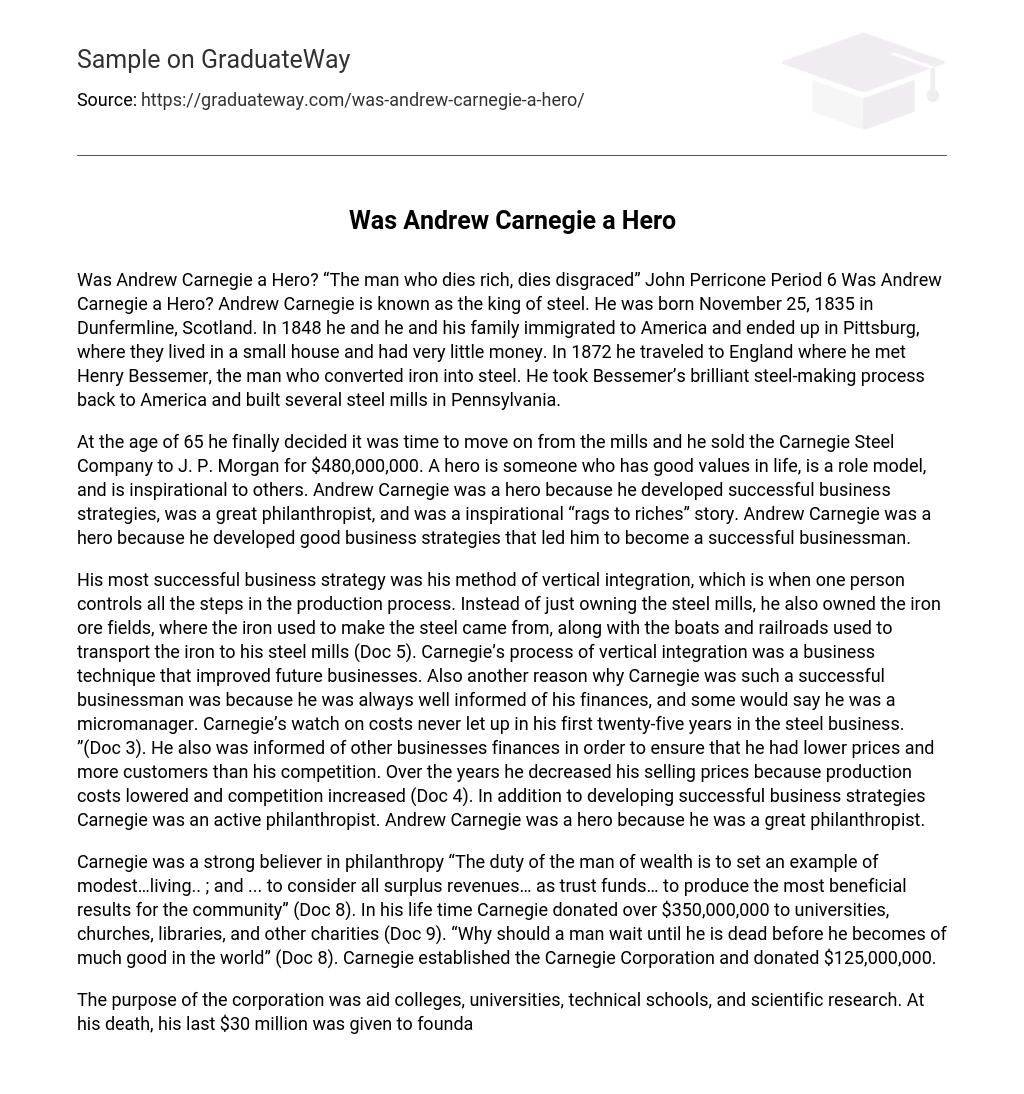“The man who dies rich, dies disgraced” John Perricone Period 6 Was Andrew Carnegie a Hero? Andrew Carnegie is known as the king of steel. He was born November 25, 1835 in Dunfermline, Scotland. In 1848 he and he and his family immigrated to America and ended up in Pittsburg, where they lived in a small house and had very little money. In 1872 he traveled to England where he met Henry Bessemer, the man who converted iron into steel. He took Bessemer’s brilliant steel-making process back to America and built several steel mills in Pennsylvania.
At the age of 65 he finally decided it was time to move on from the mills and he sold the Carnegie Steel Company to J. P. Morgan for $480,000,000. A hero is someone who has good values in life, is a role model, and is inspirational to others. Andrew Carnegie was a hero because he developed successful business strategies, was a great philanthropist, and was a inspirational “rags to riches” story. Andrew Carnegie was a hero because he developed good business strategies that led him to become a successful businessman.
His most successful business strategy was his method of vertical integration, which is when one person controls all the steps in the production process. Instead of just owning the steel mills, he also owned the iron ore fields, where the iron used to make the steel came from, along with the boats and railroads used to transport the iron to his steel mills (Doc 5).
Carnegie’s process of vertical integration was a business technique that improved future businesses. Also another reason why Carnegie was such a successful businessman was because he was always well informed of his finances, and some would say he was a micromanager. Carnegie’s watch on costs never let up in his first twenty-five years in the steel business. ”(Doc 3). He also was informed of other businesses finances in order to ensure that he had lower prices and more customers than his competition. Over the years he decreased his selling prices because production costs lowered and competition increased (Doc 4). In addition to developing successful business strategies Carnegie was an active philanthropist. Andrew Carnegie was a hero because he was a great philanthropist.
Carnegie was a strong believer in philanthropy “The duty of the man of wealth is to set an example of modest…living.. ; and … to consider all surplus revenues… as trust funds… to produce the most beneficial results for the community” (Doc 8). In his life time Carnegie donated over $350,000,000 to universities, churches, libraries, and other charities (Doc 9). “Why should a man wait until he is dead before he becomes of much good in the world” (Doc 8). Carnegie established the Carnegie Corporation and donated $125,000,000.
The purpose of the corporation was aid colleges, universities, technical schools, and scientific research. At his death, his last $30 million was given to foundations, charities, and to pensioners. “The man who dies rich dies disgraced” (Doc 8). In all, he had given away 90% of his fortune, in today’s value that would be about $4,800,000,000. Another reason why Carnegie was a hero was because he was an inspiration for many to achieve success. Andrew Carnegie was a hero because he was an inspirational “rags to riches” story.
Growing up Carnegie had to work at many various jobs, where he received a low salary in order to help support his family. His first job was as a bobbin boy, changing spools of thread in a cotton mill 12 hours a day, 6 days a week in a Pittsburgh cotton factory (BE). His starting wage was $1. 20 per week (BE). Although in 1872 after working his way up the ladder and making a comfortable $1,500 salary, Carnegie took a trip to England. There he met Henry Bessemer, who had developed a special method for converting iron into steel. Carnegie then adopted this technique and applied it to his newly built steel mills in the U.S.
Soon Carnegie revolutionized the steel industry by creating a monopoly using his business strategy of vertical integration. Years later he sold the Carnegie Steel Company to J. P. Morgan for $480,000,000, of which Carnegie revived $225,639,000 for his share. The fact that Andrew Carnegie went from being a poor immigrant to one of the world’s most revered and wealthiest business icons, is truly an inspiration for people knowing that you can accomplish anything. It is easy to see how some people could make the argument that Andrew Carnegie was not a hero, but in fact a “robber barron”.
You could say that Carnegie’s business practices of vertical integration and his philosophy of Social Darwinism only benefited the few. Also that it created an unfair opportunity for other business to succeed as well. Although Andrew Carnegie was in fact a hero because he developed successful business strategies, was a great philanthropist, and was an inspirational “rags to riches” story. Andrew Carnegie revolutionized the way people ran their business, made America a dominant power in the steel industry, and set an example for those of wealth and how they should give back.





